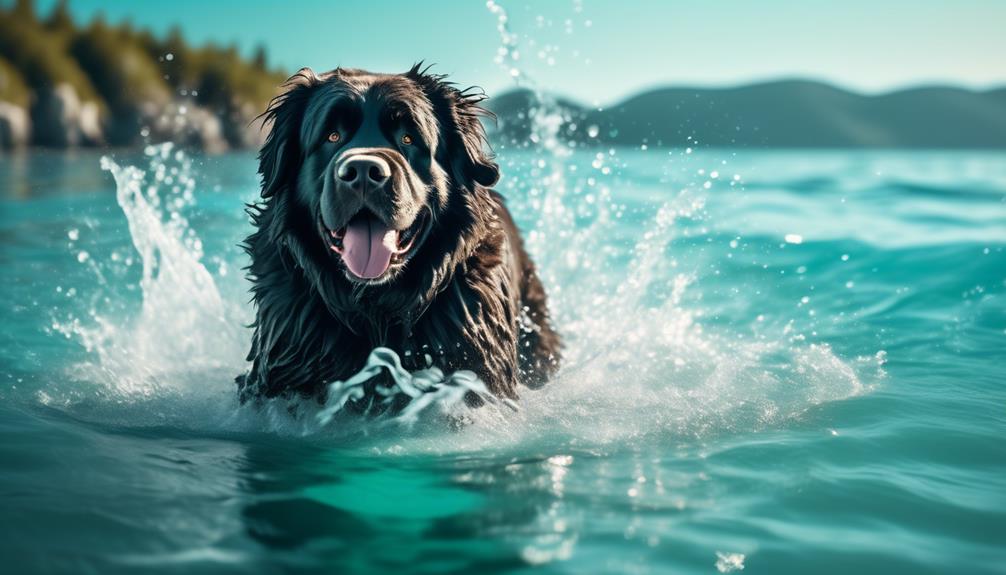Are you aware that the Newfoundland dog breed is not only known for their massive size, but also for their incredible swimming abilities?
Yes, you read that right. These gentle giants are natural-born swimmers, equipped with webbed feet and a water-resistant coat that enables them to excel in the water.
But there's so much more to learn about these remarkable dogs. From their history and characteristics to their care and grooming needs, this article will provide you with all the essential information you need to know about Newfoundland dogs.
So, get ready to dive into the fascinating world of this beloved breed and discover why they're truly one of a kind.
Key Takeaways
- The Newfoundland dog breed originated in Newfoundland, Canada and has a lifespan of 10-12 years.
- They belong to the working breed group and have an impressive size, with heights ranging from 25-28 inches and weights between 100-150 pounds.
- Newfoundland dogs are known for their sweet and lovable disposition, high intelligence, and strong desire to please their family.
- While they are relatively healthy, Newfoundland dogs are prone to certain health problems and require regular grooming, exercise, and training to keep them happy and healthy.
Origin and History
The origin and history of the Newfoundland dog breed can be traced back to Newfoundland, Canada. These dogs were originally bred by fishermen in the 18th century for their exceptional swimming abilities and strength. They were used for various tasks, such as hauling nets, rescuing drowning people, and even towing small boats. The breed's impressive size and webbed feet made them excel in water rescues and working in harsh weather conditions.
Over time, the Newfoundland dog breed gained recognition and popularity beyond Newfoundland. In the early 20th century, they faced near-extinction due to a decline in demand for their working abilities. However, thanks to the efforts of dedicated breed enthusiasts, the breed was revived and is now recognized and loved worldwide for their gentle nature, intelligence, and loyalty.
Characteristics and Care

When it comes to the characteristics and care of Newfoundland dogs, there are several important factors to consider. These gentle giants are known for their all-around friendliness and sweet disposition. They're affectionate towards children and have a high level of intelligence, making them a wonderful addition to any family.
However, their impressive size and stature require proper care and attention. Here are a few key points to keep in mind:
- Health and Care: Newfoundland dogs are relatively healthy, but they're prone to certain health problems. Regular veterinary care and screening are essential. Additionally, grooming needs, exercise requirements, and training recommendations should be followed.
- Adaptability: While they're adaptable to apartment living, there are factors to consider when choosing a dog for this type of environment. Proper exercise and mental stimulation are crucial for their well-being.
Taking care of a Newfoundland dog requires commitment, but the love and loyalty they offer in return make it all worthwhile.
Exercise and Energy Level

To ensure the well-being of your Newfoundland dog, understanding their exercise and energy level is crucial. Newfoundlands are known for their high energy level and require regular exercise to stay healthy and happy. They aren't couch potatoes and need opportunities to burn off their energy. Daily walks, swimming, and interactive play sessions are essential to meet their exercise needs.
Keep in mind that Newfoundlands are large dogs, so it's important to provide them with enough space to move around comfortably. However, it's equally important to avoid overexertion, especially in hot weather, as they're prone to heat exhaustion.
Providing mental stimulation through training and puzzle toys can also help channel their energy in a positive way. Remember, a well-exercised Newfoundland is a happy Newfoundland.
Health and Feeding

Understanding the health and feeding needs of your Newfoundland is essential for their overall well-being. Here are some important points to consider:
- Health:
- Newfoundland dogs are generally healthy, but they can be prone to certain health problems such as hip dysplasia and heart issues.
- Regular screening and veterinary care are crucial to catch any potential health issues early.
- Feeding:
- Portion control is important to prevent overeating and obesity, especially considering their large size.
- Measure their food to ensure they're getting the right amount.
- Their diet should be slow and steady to support proper growth.
- Adjust the amount of food based on their size, age, metabolism, and activity level.
- Consulting with a veterinarian for specific feeding recommendations is highly recommended.
Coat, Grooming, and Rescue

Now let's turn our attention to the important aspects of coat, grooming, and rescue for your Newfoundland.
The Newfoundland has a water-resistant double coat that requires regular grooming to keep it in good condition. They're moderate shedders, so brushing their coat a few times a week will help remove loose hair and prevent matting. Bathing should be done as needed, but be cautious not to overdo it as excessive bathing can strip the natural oils from their coat.
When it comes to rescue, it's crucial to understand the responsibilities associated with owning a Newfoundland. There are reputable rescue organizations that provide adoption and fostering options for those interested in giving a Newfoundland a second chance at a loving home. Additionally, finding a reputable breeder who offers lifetime support is essential to ensure the well-being of your Newfoundland.
Frequently Asked Questions
Are Newfoundland Dogs Good With Other Pets?
Newfoundland dogs are generally good with other pets. They have a friendly and gentle disposition that makes them compatible with other animals. However, proper socialization and supervision are still important to ensure positive interactions.
How Do Newfoundland Dogs Behave Around Strangers?
Newfoundland dogs are generally friendly and welcoming towards strangers. They have a sweet and lovable disposition and are known for being affectionate. However, every dog is unique, so it's important to socialize them properly.
Can Newfoundland Dogs Be Left Alone for Long Periods of Time?
Yes, Newfoundland dogs can be left alone for long periods of time, but it's not ideal. They thrive on human companionship and may become anxious or destructive if left alone for too long.
Are Newfoundland Dogs Good for First-Time Dog Owners?
Newfoundland dogs can be a good choice for first-time dog owners. They have a sweet and lovable disposition, are affectionate towards children, and are highly intelligent. With proper training and care, they can enrich your life.
Do Newfoundland Dogs Have Any Specific Dietary Requirements?
Newfoundland dogs have specific dietary requirements. It's important to provide them with a balanced diet that meets their nutritional needs. Consult with a veterinarian to determine the right portion sizes and types of food for your Newfoundland.
How Do Labrador Retriever Characteristics Compare to Newfoundland Dog Characteristics?
When comparing labrador retriever characteristics to newfoundland dog characteristics, there are some differences to consider. Labradors are known for their friendly and outgoing nature, while newfoundlands are gentle giants with a calm demeanor. Both breeds are loyal and intelligent, but have distinct differences in size and coat. For more labrador retriever characteristics information, consult a reputable source.
Conclusion
In conclusion, if you're looking for a furry companion that's gentle, intelligent, and adaptable, the Newfoundland dog breed is a perfect choice.
With their impressive size and sweet disposition, they make wonderful additions to any family.
While they require regular grooming and exercise, their affectionate nature and desire to please their family make them great companions for children.
Consider adding a Newfoundland dog to your home and experience the joy and love they bring.




